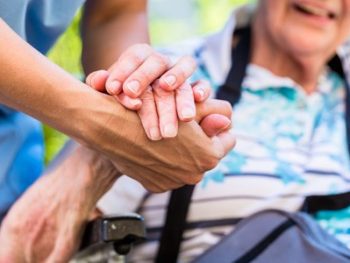 Whenever a person is about to be admitted to hospice end-of-life care, a social worker meets with the patient, family, and other caregivers to advise them of the various supportive services that are part of hospice. One of these services is Spiritual Care, provided by the Spiritual Counselor or Chaplain. The whimsical title used above is a fairly common response to the social worker’s inquiry regarding including Spiritual Care in the treatment plan. Generally speaking, only about a third of our prospective hospice patients and the families are receptive to the visits of the Chaplain. There are a number of factors that figure into this.
Whenever a person is about to be admitted to hospice end-of-life care, a social worker meets with the patient, family, and other caregivers to advise them of the various supportive services that are part of hospice. One of these services is Spiritual Care, provided by the Spiritual Counselor or Chaplain. The whimsical title used above is a fairly common response to the social worker’s inquiry regarding including Spiritual Care in the treatment plan. Generally speaking, only about a third of our prospective hospice patients and the families are receptive to the visits of the Chaplain. There are a number of factors that figure into this.
First off, when people hear “Spiritual Care” they probably think “Religion” “Church” “Preaching” and “Praying”. We live in a time when these values are not well-accepted. Statistics from some years ago reported that only about 35% of New Hampshire citizens identified themselves as being affiliated with a religious denomination or formal spiritual practice. That percentage squares rather nicely and neatly with the average amount of people who respond positively for spiritual support as part of their hospice care, at least in our area. For whatever reasons, many people choose not to participate in these values that were formerly a major characteristic of our American way of life. Perhaps they had bad experiences associated with religious and spiritual practice. Perhaps they are members of recent younger generations who have never been exposed to these values, and are lacking in knowledge or awareness of what they can mean and signify in our human lives. Recent research has called this group “the Nones” meaning they check “None” on any surveys that inquire about spiritual and religious practice or affiliation.
A second factor is that, since hospice is end-of-life care, the image a Spiritual Counselor or Chaplain conjures up is that of the Angel of Death, or at least one of its minions. Persons and their caregivers have already taken a huge step in agreeing to hospice care. They are already in a mode of mourning as they prepare for the death that will occur. Perhaps declining the services of the Chaplain is perceived as a way to forestall that awesome but inevitable reality, at least for a little bit.
So, what does the Hospice Chaplain do?
The Hospice Chaplain does not interfere in the active religious practice or formal affiliation of those patients and families who subscribe to these things. If they wish to rely on their own clergy for their end-of-life spiritual care that is something hospice care encourages. If they have fallen away from their connection to their religious fellowship and wish to renew it, the Spiritual Counselor can function as a liaison in helping that to happen. In some instances, the patient may wish to have the Chaplain serve as an auxiliary to their own clergy. Hospice will do this in consultation with the clergy person involved. If the patient identifies generally with a religious tradition, but does not wish to reestablish a formal link to that tradition, the Chaplain will try to respect that tradition in his or her service to that patient and care giving system.
In my three years of service as Hospice Chaplain for Pemi-Baker Community Health, I have been able to draw upon the interfaith background of my own family heritage. Although I am most aligned with Roman Catholic, Anglican/Episcopalian, Lutheran, and Eastern Orthodox practices, I have family-related experience with Methodist, Presbyterian, Baptist, and Pentecostal beliefs and practices. I grew up in a Jewish neighborhood in New York’s mid-Hudson Valley. I have lived in metropolitan areas where religions of other cultures were present. I see ecumenical respect and reverence as a central feature in my responsibilities as the Spiritual Counselor for Pemi-Baker’s Hospice Program. I am not out to convert anyone. I do not preach at anyone. I will pray with anyone, read the Scriptures, and even sing hymns to anyone if that is their request. But I do other things, too- and a patient does not have to be religiously disposed to engage my services.
Hospice practice usually regards Spiritual Care broadly.
That can sound squishy and fluffy to some people, but since hospice is end-of-life care, a great deal of my work is facilitating what is called “life review”. What is the unique story of this person’s life? Where are they from? Where did they grow up? What did they do for work and livelihood? Whom did they love? What was important to them? What did they enjoy and find interesting? Sometimes there are deeper existential questions. “Why is this happening to me?”, “Is God punishing me?”, or “Have I lived a good life?” and “Have I done anything worthwhile?” So I listen a lot. I affirm their accomplishments. I try to soothe any regrets they may have. I celebrate the memory of their joys. If there is “unfinished business” with family members or acquaintances, I can offer to be a bridge toward resolving and healing those things.
To offer you some specific examples, there are these.
For the lady who loved gardening, I will take a book of photographs of flowers and trees and we will look at it together. I will read a book about World War II to the Naval veteran who served in the South Pacific. I will listen to classical music to the patient who loves a particular symphony or opera. I will talk recipes with the woman who likes to watch different TV cooking shows. I will read Morning Prayer for the Episcopalian who can no longer see well enough to use his prayer book. I will spend longer time with a patient whose caregiver may need some time to go out to pick up a few groceries, giving that person some often-needed respite. When a patient is actively dying, I will “sit vigil” with them regardless of whether or not they can engage in conversation with me. I think you can see that the bulk of my work is not what is usually understood as “religious” or “spiritual”.
One of my favorite memories in my service as Hospice Chaplain is about a woman who was initially suspicious about my coming to see her. Before I first met with her, her paid caregiver told me, “She mentioned when I was getting her up that “Some priest or minister is coming to see me. I’ll see what it’s like. I don’t think I’ll want him to come again.” We had a pleasant visit, mostly life review. I did not press her to pray. Somewhat surprisingly, she was willing to have me come back for companionship support. In subsequent visits, she tended to shy away whenever I tried to move toward conversation about faith and belief, so I chose to respect that. After four or five weeks of my seeing her, she had a mini-stroke, but was able to return to her home. When I saw her next, toward the end of the visit, she asked me rather matter-of-factly, “Can you say a prayer for me?” which I naturally did. It was the first opening I had in moving in the direction of assisting her with her faith, but I thought it was an isolated event. The next week, I went for my usual visit. One of her nieces was visiting with her. As the visit came to an end, I stood up to leave, but as I passed by her chair, she reached out and grabbed my forearm tightly, and asked, “No prayer?” I turned and looked at her niece and said, “The lady wants a prayer” so I knelt down right by her chair and offered a prayer.
 So, if you’ve read this article, at some time in the future are ever involved in accessing hospice care for a family member (or even yourself), I hope you might pause before asking “The Chaplain? What for?” I’m rather easy to get along with. I’m caring and supportive. I’ll pray with you only if you want me to-though I’ll pray FOR you silently and quietly while I’m with you and as part of my own daily prayer routine and whenever I may think of you.
So, if you’ve read this article, at some time in the future are ever involved in accessing hospice care for a family member (or even yourself), I hope you might pause before asking “The Chaplain? What for?” I’m rather easy to get along with. I’m caring and supportive. I’ll pray with you only if you want me to-though I’ll pray FOR you silently and quietly while I’m with you and as part of my own daily prayer routine and whenever I may think of you.
~written by Guy Tillson, Mdiv, MA, PBCH Hospice Chaplain




















